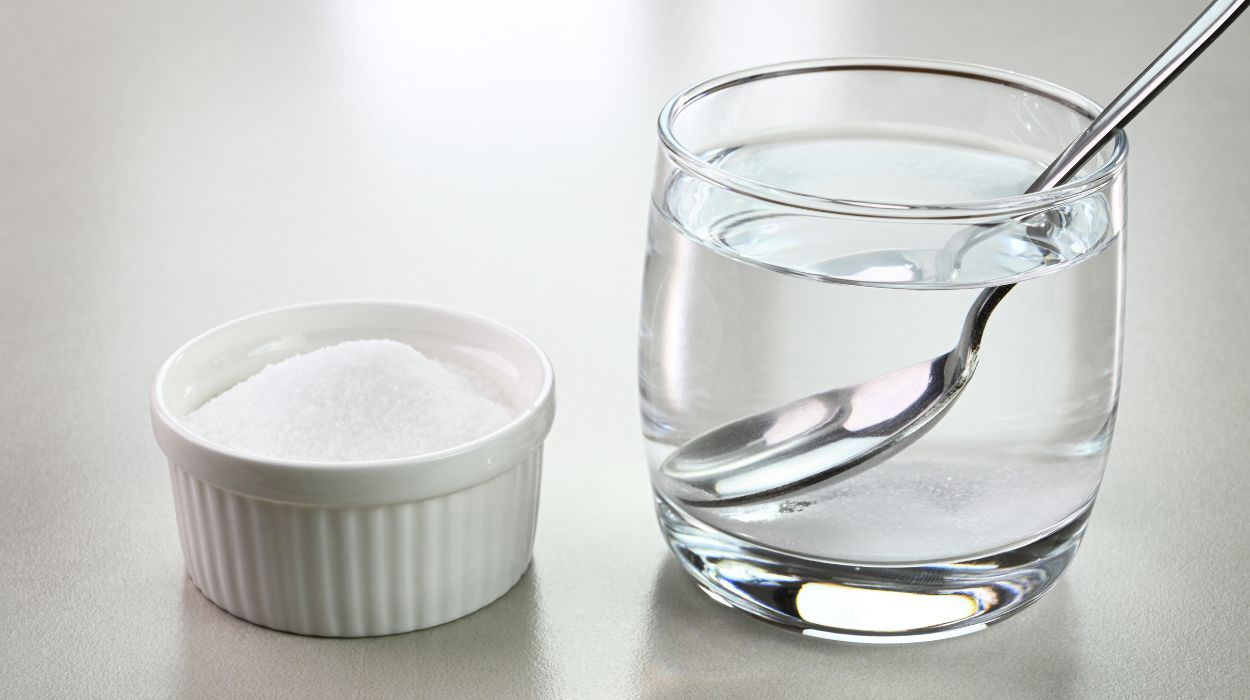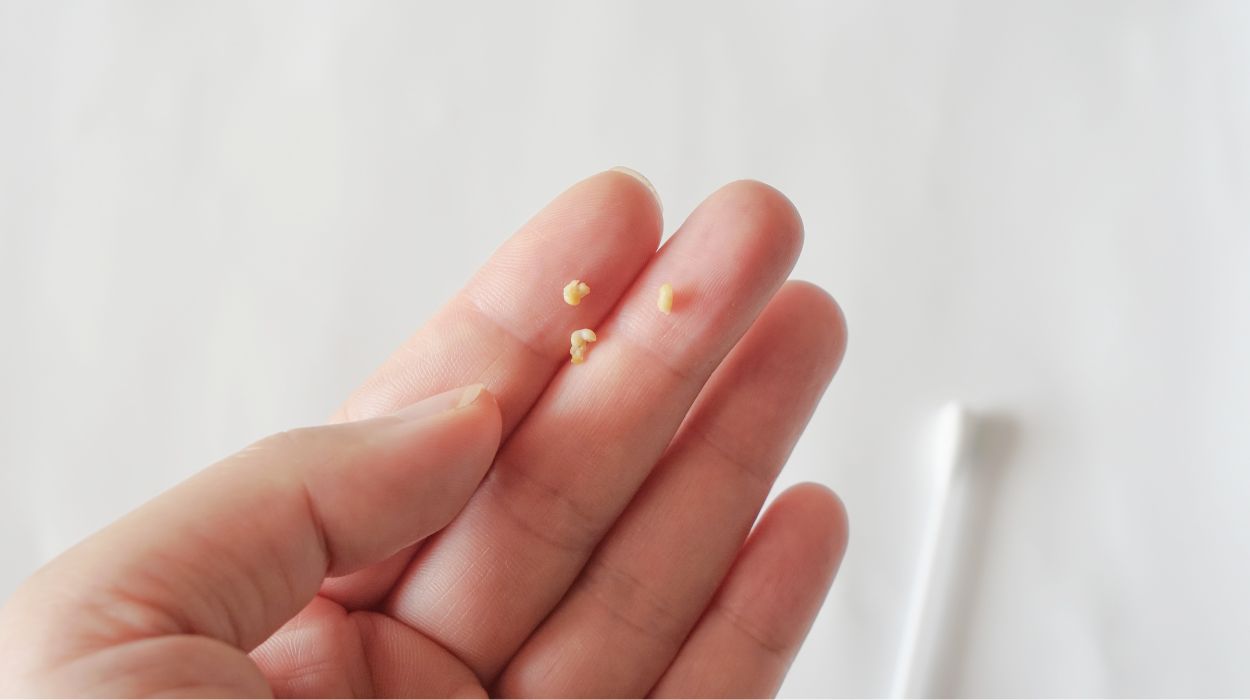That stuffing with tonsil stones needs to look no further than this article, which will walk you through everything you need to know to get them under control! Some of you may never have experienced tonsil stones or even don’t know what they are, we’ll explain the basics and teach you how you can avoid developing these in the future!
3 Tips To Get Rid Of Tonsil Stones
- Gargle
- Use a low-pressure irrigator
- Drink plenty of water
How To Get Rid Of Tonsil Stones: 3 Ways You Can Try
If you’re struggling with tonsil stones, don’t worry – there are several simple and effective ways to treat tonsil stones. Here are three of the most effective methods to remove tonsil stones:
Gargle

One of the simplest ways to dislodge a tonsil stone is to gargle with salt water. The salt will help to reduce inflammation and kill bacteria, while the warm water will help to soften and break up the stones. To make a saltwater gargle, simply mix one teaspoon of salt in a glass of warm water, then gargle for 30 seconds to one minute. Repeat this process several times a day until the stones are gone.
Use A Low-Pressure Irrigator
Another effective way to dislodge tonsil stones is to use a low-pressure irrigator, such as a Waterpik. This device uses a gentle stream of water to remove debris and soften the stones, making it easier to dislodge them. To use a Waterpik, fill the reservoir with warm water and salt, then place the tip in your mouth and aim it at the tonsils. Start with a low-pressure setting, and gradually increase the pressure until you’re able to dislodge the stones. Repeat the process several times a day until the stones are gone.
Drink Plenty Of Water

Drinking plenty of water is also an effective way to get rid of tonsil stones. When you’re dehydrated, your saliva becomes thicker and less able to flush out debris, making it easier for tonsil stones to form. By drinking plenty of water, you can help to keep your saliva thin and flowing, reducing the risk of a tonsil stone. One easy tip is to aim to drink at least 8 glasses of water a day, and more if you’re sweating or active.
What Are Tonsil Stones?
Tonsil stones, also known as tonsilloliths, are small, white or yellowish deposits that form in the crevices of the tonsils. They are made up of a mixture of calcium, bacteria, and other debris that can accumulate in the tonsils over time. Although tonsil stones are generally harmless, they can cause discomfort and bad breath, and in severe cases, they can even block the airway and make it difficult to breathe.
Tonsil stones are more common in people who have larger tonsils or suffer from chronic tonsillitis. However, they can occur in anyone, regardless of age or overall health. Some of the symptoms of tonsil stones include a persistent sore throat, difficulty swallowing, and bad breath. If you suspect you have tonsil stones, it’s important to see a doctor to have them properly diagnosed and treated.
In many cases, tonsil stones can be easily removed using home remedies, such as gargling with salt water or using a low-pressure irrigator. In more severe cases, surgery may be required to remove the tonsils. By following a healthy diet and maintaining good oral hygiene, you can reduce the risk of tonsil stones and maintain overall oral health.
What Causes Tonsil Stones?
The tonsils, located at the back of the throat, are part of the body’s immune system and help to protect against infections. However, they also contain small pockets, known as tonsil crypts, which can trap particles of food, dead cells, and other debris. Over time, this debris can calcify in these tonsillar crypts and form small, hard tonsil stones.
Several factors can contribute to the formation of tonsil stones, including:
- Chronic tonsillitis[1]: People who suffer from chronic tonsillitis, or inflammation of the tonsils, are more likely to develop tonsil stones. The inflammation can cause the tonsils to enlarge, creating more pockets for debris to accumulate in.
- Poor oral hygiene: Neglecting to brush and floss regularly can lead to a buildup of plaque and food particles in the mouth, increasing the risk of tonsil stones.
- Dehydration: When you’re dehydrated, your saliva becomes thicker and less able to flush out debris, making it easier for tonsil stones to form.
- Certain medical conditions: People with certain medical conditions, such as post-nasal drip, acid reflux, and allergies, are more likely to develop tonsil stones.
In addition to these factors, certain lifestyle habits, such as smoking and drinking alcohol, can also increase the risk of tonsil stones. It’s important to maintain good oral hygiene, drink plenty of water, and see a doctor if you suspect you have tonsil stones. Early detection and treatment can help to prevent the stones from becoming larger and causing more serious health problems.
How To Know If You Have Tonsil Stones?
Here are a few signs[2] that may indicate you have tonsil stones:
- Bad breath[3]: Tonsil stones can cause a persistent bad odor in the mouth, even after brushing and flossing.
- Sore throat: Tonsil stones can cause discomfort or a sensation of something being stuck in the back of the throat.
- Difficulty swallowing: Tonsil stones can cause difficulty or pain while swallowing.
- White or yellow deposits: Tonsil stones may be visible as small, white or yellowish deposits in the tonsils.
- Ear pain: Tonsil stones can sometimes cause referred pain in the ears.
If you are experiencing any of these symptoms, it’s important to see a doctor for proper diagnosis and treatment. A tonsil stone can be difficult to diagnose based on symptoms alone, as other conditions, such as tonsillitis or a sore throat, can cause similar symptoms. A doctor can perform a physical examination or order imaging tests, such as a CT scan, to determine if you have tonsil stones. Early diagnosis and treatment can help to prevent the stones from becoming larger and causing more serious health problems.
Tips To Prevent Tonsil Stones
To prevent and eliminate tonsil stones, consider the following tips:
- Maintain good oral hygiene: Brushing your teeth twice a day and flossing regularly can help to remove plaque and food particles from your mouth, reducing the risk of a tonsil stone.
- Stay hydrated: Drinking plenty of water can help to keep your mouth moist and prevent the formation of tonsil stones. Shoot to drink at least 8 glasses of water per day.
- Avoid certain foods: Certain foods, such as dairy products and processed foods, can increase the production of mucus and contribute to the formation of a tonsil stone.
- Use a saline gargle[2]: Gargling with salt water can help to flush out any debris that may be trapped in the tonsils and prevent the formation of tonsil stones.
- Avoid smoking and excessive alcohol consumption: Smoking and excessive alcohol consumption can dry out your mouth and increase the risk of a tonsil stone.
- Treat underlying medical conditions: If you have a medical condition, such as post-nasal drip or acid reflux, it’s important to seek treatment to help prevent tonsil stones.
- See a doctor regularly: Regular check-ups with a doctor can help to detect and prevent tonsil stones early on. Your doctor may also recommend other preventive measures, such as using a low-pressure irrigator or undergoing a tonsillectomy, in certain cases.
By following these tips, you can help to prevent tonsil stones and maintain overall oral health. If you suspect you have tonsil stones, it’s important to see a doctor for proper diagnosis and treatment.
When To Seek Medical Attention
While tonsil stones are generally harmless, there are certain situations in which it’s important to seek medical attention. Here are a few signs that you should see a doctor for tonsil stones:
- Persistent symptoms: If you have persistent symptoms, such as sore throat, throat pain, difficulty swallowing, or bad breath, it may be a sign that you have tonsil stones. A doctor can help to diagnose the condition and recommend the appropriate treatment.
- Difficulty breathing: If you are experiencing difficulty breathing, it may be due to a large tonsil stone blocking your airway. This can be a serious medical emergency and requires immediate attention.
- Recurring tonsil stones: If you are experiencing recurrent tonsil stones, despite using home remedies or following preventive measures, it may be a sign of a more serious underlying condition. Also, seek medical treatment if tonsil stones persist despite home treatment. A doctor can help to determine the cause and recommend the appropriate treatment.
- Swelling or pain: If you have swelling or pain in your tonsils, it may be a sign of a more serious condition, such as tonsillitis or an infection. It’s important to see a doctor to determine the cause and receive appropriate treatment.
- Large tonsil stones: If you have large tonsil stones that are difficult to remove, it may be necessary to seek medical attention. In some cases, surgery may be required to remove the tonsils.
It’s important to note that tonsil stones are not always visible and may be detected through a physical examination or imaging tests. If you suspect you have tonsil stones, it’s important to see a doctor for proper diagnosis and treatment. Early detection and treatment can help to prevent the stones from becoming larger and causing more serious health problems.
Conclusion
Let’s summarize what we discussed in this article! Tonsil stones or tonsilliths are deposits that accumulate in the tonsils, which can cause pain and bad breath. You can get rid of tonsil stones at home, such as gargling, using a low-pressure irrigator, and drinking plenty of water. In addition, you can help prevent tonsil stones by maintaining good oral hygiene, avoiding certain foods, and doing things to sustain a good healthy lifestyle. Some tonsil stones are due to underlying medical conditions, and it’s always best to get a check-up by a healthcare professional if you suspect you may have tonsil stones.
Frequently Asked Questions
Several factors can contribute to the formation of tonsil stones including chronic tonsillitis; dehydration; poor oral hygiene; certain medical conditions; and more.
Use low-pressure irrigation; gargle salt water; and drink plenty of water.
Bad breath; sore throat; difficulty swallowing; ear pain; and white or yellow deposits on the tonsils.
If symptoms are persistent; difficulty breathing; recurrent tonsil stones; swelling or pain of tonsils; or large tonsil stones.
 Expert's opinion
Expert's opinion
